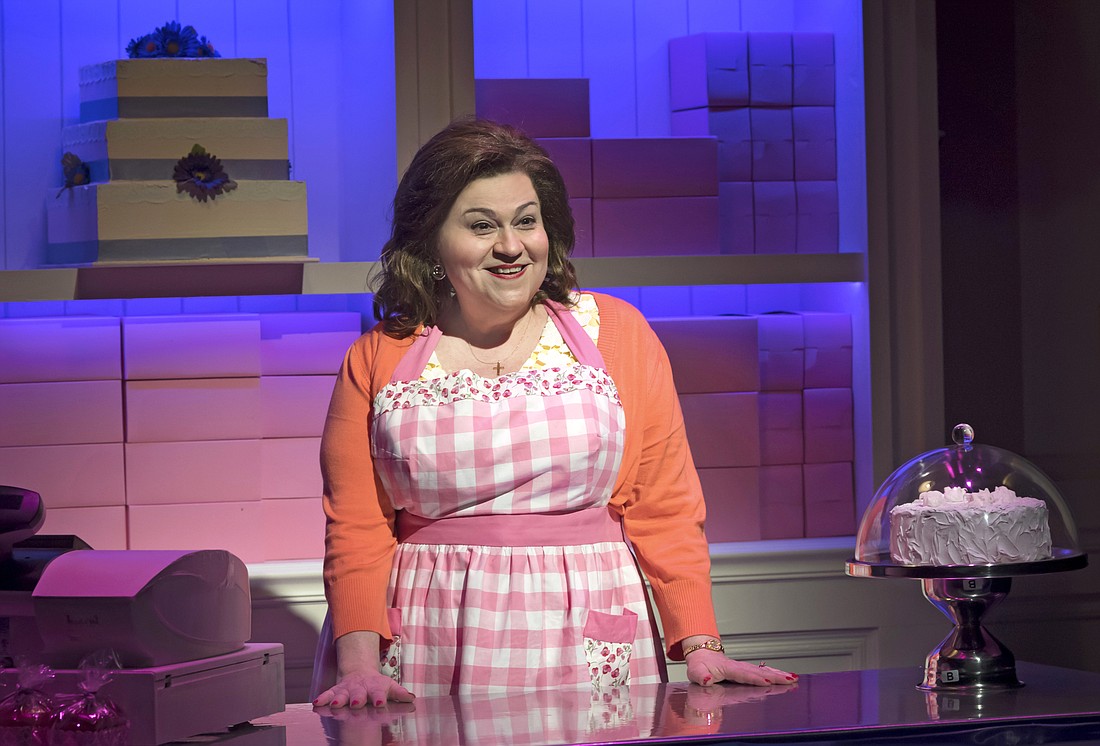- July 26, 2024
-
-
Loading

Loading

Cakes are sweet, though sinfully fattening. They might wreck a diet, but you wouldn’t think they’d start a war. But that’s exactly what happens in Bekah Brunstetter’s “The Cake,” the latest Asolo Repertory Theatre production.
The initial skirmish erupts in Della’s Sweets, a bakery in Winston-Salem, N.C. Della (Cindy Gold), the eponymous owner, is a fundamentalist in both baking and religion. She believes in following the recipe, whether if it’s for baked goods or Biblical marriage. It’s worked for Della so far. Her cakes are a hometown hit, and they’ve earned her a chance to compete on the “Great American Baking Show.”
As the play opens, Della shares her good news with Macy (DeAnna Wright), a young, African-American woman who walks into her shop. But Macy has never heard of the show — and scorns the concept behind it. “I can’t do food TV. It fetishizes an industry that's killing hundreds of thousands of people a year.” Macy shares a few more harsh food facts. Then Della’s goddaughter, Jen (Amanda Fallon Smith), walks in and lightens the mood. It’s all hugs and happiness — until Jen and Macy ask her to do their wedding cake. Della awkwardly says “no” to the lesbian couple. She doesn’t quote the Good Book; she merely claims to be overbooked. But Macy and Jen see through Della’s transparent excuse and leave in disgust. The battle of the cake is over before it started. But the war has just begun.
Director Lavina Jadhwani takes a breezy comic tone with occasional flashes of hurt. She keeps the focus on people. Their belief systems matter, but only to the extent that help or hurt. Jadhwani reveals the characters’ hearts without judging or lecturing. It’s exactly what Brunstetter’s script demands.
Gold’s Della is wrongheaded but warmhearted. Baking is her life — a nurturing way to bless others with a taste of sweetness. (In Della’s heart, she’d love to give that blessing to Jen and Macy, despite her belief system.) Della’s married to a jovial plumber named Tim (Paul Romero). The character initially comes off as a one-dimensional good old boy. But you gradually discover that Tim has problems that a pipe wrench won’t solve.
Smith’s multifaceted Jen has problems of her own. The quaver in her voice hints of Jen’s struggles to accept her sexual identity after being raised in a strict fundamentalist household. Wright’s Macy experienced her own childhood rejection and got through it with no adult ambivalence. Her character takes stands, draws lines and speaks eloquent truth to power. Compared to some real world social justice warriors, Macy is a model of restraint — but she often seems harsh on stage. I think that’s the reason Brunstetter created her. Macy does all the PC finger-pointing, freeing up the playwright to play softball satire and humanize Della. A clever device, but an underwritten character. Despite these limitations, Wright brings real fire to the role.
Collette Pollard’s sweet set is circular, very much like a cake. It cleverly revolves, revealing Della’s elaborate bakery on one side, and a generic, middle-class bedroom on the other. Melissa Ng’s costumes quickly show you which side each character is on. Sarah Hughey’s lighting alternates between the bright, happy bakery of Della’s waking life, to darker dreams where she quivers before the disembodied voice of the baking show host, who seems to be judging her from on high. (Kudos also to Matt Parker for the surreal sound design.)
Despite the heavy subject matter, the play’s tone is light and entertaining, where it could easily have been manipulative and preachy. While the story flows from a landmark case that went to the Supreme Court, the playwright makes it personal. Nobody’s taking Della to court in her play. The pain is all in the family.
Speaking of which, Della has much in common with Archie Bunker. She may be a bigot, but she’s loveable. Instead of demonizing Della, the playwright humanizes her. Brunstetter (who’s actually from Winston-Salem) rejects Della’s point of view. But she doesn’t reject Della.
The playwright clearly hates homophobia — and assumes you’ll agree with her if you bought a ticket to her play. “The Cake” is her plea for understanding — specifically a plea to understand Southerners who’ve been raised in the tightest section of the Bible Belt. “Hate the sin but love the sinner,” seems to be the point. But a real-life Macy might say, “Hate the sin and hate the sinner.”
Brunstetter’s sweet confection of a play doesn’t settle the issue.
Outside the theater, the battle continues.
And the war is far from over.